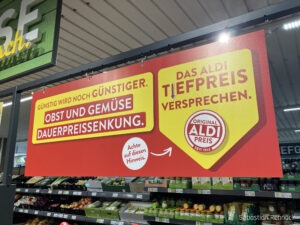Aldi underscores its price leadership
Aldi moves first to permanently reduce prices for olive oil in Germany. The discounter is the reference points for essential food prices in Germany, but rivals Lidl and Kaufland are intensifying the pressure on Aldi’s dominant position. After its significant investments aimed at modernizing operations over the past year, Aldi has commited to an even more aggressive pricing than in the past.

Aldi emphasizes its price leadership in-store with its ‘Tiefpreisversprechen’ (low-price promise), also in the fresh ranges
Aldi underlines its claim to price leadership in Germany. Aldi Nord and Aldi Süd permanently cut the price of olive oil by 30 percent. With this move, the discounter sets a clear signal as price leader for a commodity whose costs have more than doubled since the outbreak of the war in Ukraine. According to the International Monetary Fund, global olive oil prices have fallen by around 15 percent since the beginning of the year. Food inflation in Europe’s largest economy has fallen from record double-digit levels last year and has been plateauing around two percent since the spring of this year, according to the Federal Statistics Office.
Since January, Aldi has actively promoted double-digit price reductions on essential items such as wheat flour, canned tomatoes, French fries and breakfast products, to increase market competitiveness. However, channel competitor Lidl and its sister company Kaufland are keeping Aldi on its toes. Both have begun to challenge the discount veteran’s position as the market’s price leader. The Schwarz Group’s price cuts on ice cream and sunscreen in July came as a surprise to Aldi, as did the recent price cuts on sugar at Lidl and Kaufland. While Lidl and Kaufland cut the price of white sugar from €1.49 to €0.99, Aldi responded decisively with a price of 89 cents.
Aldi Nord in summer this year had announced a more aggressive pricing policy than in past years. The discounter’s northern arm for several years had been in a restructuring process that was completed a year ago. The turnaround strategy started in 2018 had consumed several billion euros and included major investments into the update of the store network, the modernization of the IT structure, the logistics network and included major changes in the head office organization.
Aldi is the reference point for food prices in the German market. All retailers monitor the discounters’ prices for basic private label products on a regular basis and match them, whether with their own brands or with manufacturers’ products. In order to communicate price competitiveness at the shelf, market leader Edeka uses the red “gut & günstig” (good and cheap) logo to identify those manufacturer brands listed in the permanent ranges at the discounters. It uses the slogan “discountbillig” for its comparable private labels. Rewe supermarkets use a similar mechanism and price communication.
Related news
Brits Embrace At‑Home Celebrations While Germans Cut Back on Valentine’s Day Spending
🎧 Hallgasd a cikket: Lejátszás Szünet Folytatás Leállítás Nyelv: Auto…
Read more >Lidl launches campaign with tennis star Steffi Graf
🎧 Hallgasd a cikket: Lejátszás Szünet Folytatás Leállítás Nyelv: Auto…
Read more >Lidl Magyarország wins Top Employer award once again
🎧 Hallgasd a cikket: Lejátszás Szünet Folytatás Leállítás Nyelv: Auto…
Read more >Related news
How Coca-Cola plans to build more billion-dollar brands
🎧 Hallgasd a cikket: Lejátszás Szünet Folytatás Leállítás Nyelv: Auto…
Read more >







